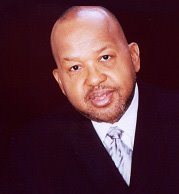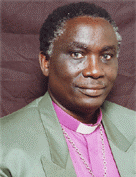A piano should fall on their heads.
 Once again, this month’s “A Piano Should Fall on His Head Award” goes to two individuals. I couldn’t decide which of them is the bigger loser, so I’m going to name both of them.
Once again, this month’s “A Piano Should Fall on His Head Award” goes to two individuals. I couldn’t decide which of them is the bigger loser, so I’m going to name both of them. Last month on Good Friday (not Greek Orthodox Good Friday, but the other one), Bishop Alfred A. Owens Jr., the pastor of Greater Mount Calvary Church in the northeastern section of Washington D.C., issued an altar call—you know, one of those fire and brimstone sermons during which the preacher urges all those unrepentant sinners to come forward and claim Jesus as their Lord and Savior. One question: If an altar boy responds to an altar call, does that make him an altar call boy?
Anyway, Owens’ altar call contained an interesting and rather disturbing disclaimer. Apparently, there are some sinners that are just so far gone in their wretchedness that they’re beyond salvation. Yes, brothers and sisters, you know who I’m talking about: those nasty homosexuals. Well, at least that’s what Owens thinks, because in his invitation to the altar, he made it clear that

“It takes a real man to confess Jesus as Lord and Savior… I’m not talking about no faggot or no sissy… Wait a minute! Let the real men come on down here and take a bow… all the real men. I’m talking about the straight men.”
Sigh. I guess gay men just aren’t welcome at God’s lunch counter. Then again, conservative African-American clergy are among the most homophobic of the evangelical fold, so perhaps we shouldn’t put too much stock in Owens’ notion of who is eligible for God’s grace and who is not.
Moreover, Owens’ machismo is completely absent from Jesus’ own sense of what is required to enter the Kingdom of God. In one of the most enigmatic passages in all the Gospels, Jesus says to his disciples
“For there are eunuchs who have been so from birth, and there are eunuchs who have been made eunuchs by men, and there are eunuchs who have made themselves eunuchs for the sake of the kingdom of heaven. Let the one who is able to receive this receive it” (Matthew 19:12)
I don’t want to assume that everyone knows what a eunuch is. It’s a man who has undergone castration (i.e. whose testicles have been removed, though I have read that some eunuchs had their penises removed as well, but this was less common). Less clear is what is meant by this passage. Many commentators have concluded that Jesus is making a statement advocating celibacy. After all, eunuchs had no libido, which is why in the ancient world they served as the trusted guards of the women’s quarters, right? Actually, men who undergo castration after puberty do not always lose their libido. Many are able to experience arousal. More importantly, eunuchs were not always celibate.
The equation of eunuch = celibacy in many commentaries on this passage arises from a fundamental misconception about the sex lives of eunuchs in the ancient world. The reality is that eunuchs quite often played the passive role in sexual intercourse with other men. They got fucked, in other words. In this way, in the eyes of the ancients they suffered a twofold loss of their masculinity: first the loss of their balls and then by playing the woman’s role in sex. Eunuchs were also known for their “softness” and effeminacy.
So what did Jesus mean when he said that anyone who can make himself a eunuch for the sake of the kingdom of heaven should just do it? Everyone knows that Jesus spoke in parables and riddles, so it’s doubtful he was advocating that his male followers hack their nuts off. So what did he mean then?
He meant the exact opposite of what Owens said in his altar call. In Jesus’ version of the kingdom of heaven, complete gender equality would be the norm. Therefore, in order to enter the kingdom of heaven, a man must put aside his gender and all the privileges of patriarchy, which was the established order in the Mediterranean world of Jesus’ day. This is also what Jesus was trying to convey, among other things, when he washed his disciples feet. He was attempting to overturn and subvert the prevailing notions of gender and gender roles. In other words, it’s those very sissies and faggots rejected by Owens that will be entering the kingdom of heaven much faster than “the real men” he invited to the altar. It’s a radical notion, but one that is not at all inconsistent with the Historical Jesus.
 As reprehensible as Owens’ sermon was, he is going to have to share his piano with The Most Reverend Benjamin Nzimbi, the Archbishop of Kenya’s Anglican Church. Earlier this week, Nzimbi withdrew his invitation to meet with The Right Reverend John Gladwin, Bishop of Chelmsford in the United Kingdom, who was recently named as one of four new patrons of Changing Attitude, the campaigning group that aims at equality of opportunity for GLBT people in the Anglican Church. Gladwin was traveling with a contingent of 20 other Anglican clergy in Africa on a trip whose mission was to strengthen ties between four dioceses in Kenya and Chelmsford, when he was informed that hospitality had been withdrawn by the Church of Kenya on account of Gladwin’s support of greater inclusivity and equality for GLBT people.
As reprehensible as Owens’ sermon was, he is going to have to share his piano with The Most Reverend Benjamin Nzimbi, the Archbishop of Kenya’s Anglican Church. Earlier this week, Nzimbi withdrew his invitation to meet with The Right Reverend John Gladwin, Bishop of Chelmsford in the United Kingdom, who was recently named as one of four new patrons of Changing Attitude, the campaigning group that aims at equality of opportunity for GLBT people in the Anglican Church. Gladwin was traveling with a contingent of 20 other Anglican clergy in Africa on a trip whose mission was to strengthen ties between four dioceses in Kenya and Chelmsford, when he was informed that hospitality had been withdrawn by the Church of Kenya on account of Gladwin’s support of greater inclusivity and equality for GLBT people. The Anglican Church of Kenya has been rather fickle in the support it has shown for tolerance and equality. Not surprisingly, Kenya bishops applauded Archbishop of Canterbury Rowan Williams’ call for greater tolerance of religious minorities in the predominantly Muslim country of Sudan, where violence against the Christian population has taken on the dimensions of genocide. “The question is how will the government of this country in the years ahead make sure that Sudan is known for creative, democratic tolerant policies that will work for the good of an entire population,” Williams said.
Of course, the other question is how the Church of Kenya can encourage the pursuit of “creative, democratic tolerant policies that will work for the good of an entire population” in a place like Sudan while supporting discrimination against sexual minorities at home. Are they not part of the population?
There’s also the thorny issue of polygamy. Prior to the 1990s, Anglican bishops in the West turned a blind eye to African polygamy as long as African bishops toned down their criticism of the divorce rate among Western Christians. Recently, however, African Christians have been criticized by the West for taking a hard line against homosexuality and same-sex marriage, while defending the practice of polygamy. In 2002, the Anglican Church of Kenya finally issued a statement condemning polygamy, arguing that monogamy is God’s plan for marriage.
Support for polygamy by African Christians has been something of an embarrassment for conservatives who insist that marriage is properly defined as the relationship between one man and one woman, while liberals have pointed to the basic hypocrisy of condemning same-sex marriage while tolerating (or defending) polygamy. Although the Anglican Church of Kenya has officially condemned polygamy, unofficially there remains a high degree of tolerance for this deeply rooted practice.
The Kenyan statement takes a pastoral stance where polygamy still persists. While it teaches monogamy, the Church must be “pastorally sensitive to the widespread existence of polygamy.” The Kenyan Church understood that if a polygamist became a Christian and put away all his wives but one, the rest could face the immanent danger of becoming prostitutes. Therefore the slow fading out of the practice was encouraged.
Why has the Kenyan Church chosen to take a pastoral approach and reach out to those who engage in one officially condemned practice—let’s call it a lifestyle—while refusing even to meet with those who disagree with them on the subject of another condemned practice? This is the classic double standard of African Christians. It probably doesn’t help that they view polygamy is an indigenous custom, while homosexuality is viewed as a foreign practice.
I am not advocating that the Kenyan Church take a hard line approach to the unfortunate and vulnerable wives of polygamists. Doubtless, it was their social and economic powerlessness within a patriarchal social structure that put them in their predicament in the first place. There was a reason Jesus told his disciples that all men should become eunuchs.












5 Comments:
Personally, think an organ should fall on their heads. It's a heavier and much more spectacular item to have drop on you. I'm totally intolerant of those who have blatantly hijacked and distorted the message of Jesus, just as much as I am of those who have hijacked and distorted the intrinsic meaning of Islam.
As to eunuchs in the ancient world, they were everywhere and you are right--if the castration is done enough after puberty, there can be erection although no emission of sperm. There are documented instances of castrati, the great opera singers of the 18th and 19th centuries, being the lovers of wealthy and highly placed women because there was no danger of pregnancy, while there was every promise of sexual fulfillment.
And there were butch eunuchs, even warrior eunuchs. Narses, "The Hammer of the Goths," lived to be 95 years old and in his 70s was able to drive the Ostrogoths from Italy and return the entire Italian peninsula to the Emperor in Constantinople. He was a Romanized Armenian whose life spanned the turn of the fifth and sixth centuries, much of it in service to Justinian I, and he had real balls--whether literally or figuratively being irrelevant in the light of his accomplishments.
I always wondered what happened to the flying pianos from Northern Exposure...
I'm fascinated by this idea that spirituality can somehow be measured in terms of masculinity -- that the manlier you are, the fitter you are to go to Heaven. When did this start, I wonder?
I’m not talking about no faggot or no sissy… Wait a minute! Let the real men come on down here and take a bow… all the real men. I’m talking about the straight men.”
Somebody needs to punch that ignoramous bastard square between the eyes! Oh wait.. I am not a violent person, scratch that. :)
I agree with Will, an organ would be much more appropriate than a piano. Perhaps their fear of a particular organ might even be at the heart of some sort of internalized homophobia?
This masculinist, muscular Christianity comes to close to certain facist versions of the past for my comfort. Christianity was seen as effeminate in other times.
Post a Comment
<< Home